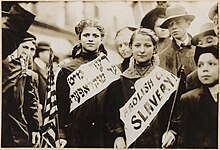The Hershey Company
After a third failed business attempt in New York City, Hershey returned to Pennsylvania, where he founded the Lancaster Caramel Company in 1883.
The introduction of machine wrapping in 1921 sped up the process and added a small paper ribbon to the top of the package, indicating that it was a genuine Hershey product.
[14] On July 2, 1963, the H. B. Reese Candy Company merged with the Hershey Chocolate Corporation in a tax-free stock-for-stock merger.
[18][19][20] In the late 1930s, Hershey confronted labor unrest as a Congress of Industrial Organizations-backed union attempted to organize the factory workers.
A failed sit-down strike in 1937 ended in violence; loyalist workers and local dairy farmers beat many of the strikers as they attempted to leave the plant.
From around 1938 to 1952, Milton Hershey tried to make toilet soap, which saw a big boom after the Great Depression as well as other hygiene-related items such as shampoo, toothpaste and perfume.
Hershey took this opportunity to try to open a store on the Atlantic City Boardwalk, which sold cocoa butter scented toilet soap.
[21] Shortly before World War II, Bruce Murrie, son of long-time Hershey's president William F.R.
[22] In 1969, Hershey received a license from UK-based Rowntree's to manufacture and market Kit Kat and Rolo in the United States.
[24] In 1988, Hershey's acquired the rights to manufacture and distribute many Cadbury-branded products in the United States (except gum and mints, which are part of Mondelēz International).
Former Pennsylvania Attorney General LeRoy S. Zimmerman became the new chairman of the reconstituted Milton Hershey School Trustees.
[34] Hershey would later in 2020 sell Krave Jerky to Sonoma Brands, the food industry incubator founded by Sebastiani in 2016.
[35] In July 2005, Hershey acquired the Berkeley, California-based boutique chocolate-maker Scharffen Berger Chocolate Maker.
[37] In September 2006, ABC News reported that several Hershey chocolate products were reformulated to replace cocoa butter with vegetable oil as an emulsifier.
"[38] In December 2011, Hershey reached an agreement to acquire Brookside Foods Ltd., a privately held confectionery company based in Abbotsford, British Columbia.
[23] In 2017, Hershey acquired Amplify Snack Brands, the Austin, Texas-based manufacturer of SkinnyPop in an all-cash transaction valued at approximately $1.6 billion.
[51] The school's initial purpose was to train young men in trades but eventually shifted to focus on preparation for college.
[55] In February and April 2007, Hershey's announced that the Smiths Falls[56][57] and Oakdale[58][59] plants would close in 2008, being replaced in part by a new facility in Monterrey, Mexico.
[62] On March 9, 2018, Hershey broke ground to expand its Kit Kat manufacturing facility in Hazle Township, Pennsylvania.
In 2015, Hershey announced a commitment to the Clinton Global Initiative to help build a sustainable supply chain to support basic nutrition for children in Ghana.
[68][69][70][71] Product recalls Hershey has been criticized for not having programs to ensure sustainable and ethical cocoa purchases, lagging behind its competitors in fair trade measures.
campaign was launched in September 2010 by Global Exchange, Green America, the Oasis Trust, and the International Labor Rights Forum.
The purpose of the Raise the Bar Campaign was to pressure Hershey to commit "to take immediate action to eliminate forced and child labor ... from Hershey's cocoa supply"; "to sourcing 100% Fair Trade Certified cocoa beans by 2012 for at least one of its top five selling chocolate bars ... making at least one additional top five selling bar 100% Fair Trade Certified every two years thereafter"; and that "the majority of Hershey's cocoa across all products will be Fair Trade Certified by 2022".
The pressure was particularly directed at Whole Foods Market, which announced on October 3, 2012, that it would cease carrying Hershey's Scharffen Berger line.
[77] In 2019, Hershey announced that they could not guarantee that their chocolate products were free from child slave labor, as they could trace only about 50% of their purchasing back to the farm level.
[78] In 2021, Hershey was named in a class action lawsuit filed by eight former child slaves from Mali who alleged that the company aided and abetted their enslavement on cocoa plantations in Ivory Coast.
The suit accused Hershey, Nestlé, Cargill, Mars, Incorporated, Olam International, Barry Callebaut, and Mondelez International of knowingly engaging in forced labor, and the plaintiffs sought damages for unjust enrichment, negligent supervision, and intentional infliction of emotional distress.



